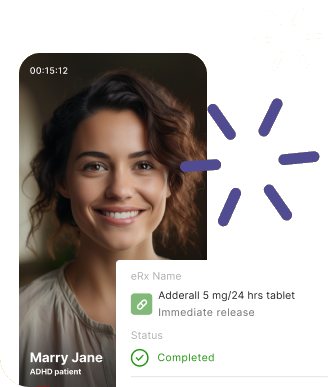Their inclusion does not guarantee they will be prescribed to any individual, as treatment decisions are ultimately at the discretion of healthcare providers. Healthcare providers may prescribe other medications or recommend non-pharmacological treatment based on the patient’s unique health circumstances and needs. Read more
Adderall has a
Highlights
- Adderall (dextroamphetamine and amphetamine) is a commonly prescribed medication for treating attention deficit hyperactivity disorder (ADHD).
- Adderall is associated with headaches in two contrasting ways: firstly, it can cause them; as many as one in four people taking Adderall experience headaches, making it a common side effect. Secondly, it might cause headaches indirectly, through other side effects.
- Adderall can cause decreased appetite leading to low blood sugar and dehydration, which may contribute to headaches. Insomnia-related headaches may also occur.
You might be on Adderall, about to start taking it, or know someone on it, and you want to know if and why it causes headaches, and what to do about this.
The subject of Adderall and headaches is complex, but once you understand the link, you’ll be able to manage the situation going forward. This article has all the necessary information, so let’s get into it.
Can Adderall Cause Headaches?
Yes it can, and headaches are listed as one of the
Adderall is a central nervous system stimulant medication. Stimulants are a first-line ADHD treatment and work well to control the core symptoms of this condition in
Adderall is a Schedule II substance because of the high potential for drug abuse. Because of this, you can only get an Adderall prescription from a medical professional. Like any medication, Adderall has side effects; remember to discuss anything out of the ordinary with your healthcare provider.

Why Does Adderall Cause Headaches?
Adderall can give you a headache in two ways:
Directly as an effect of the medication[5] , or an iatrogenic headache.- And, indirectly, through other side effects of Adderall, which we’ll look at now.
Increased Blood Pressure
One theory is that the changes seen in blood pressure and heart rate might cause Adderall headaches. Unfortunately, in some people, Adderall pushes up both, and high blood pressure is
Decreased Appetite
Low Blood Sugar
Another common effect of Adderall is decreased appetite and weight loss; people forget to eat, resulting in low energy intake. This results in low blood sugar, also known as glucose. The brain can only use glucose as fuel, and if it cannot get enough, it can’t function well, causing dizziness and headaches.
Dehydration
With the decreased appetite, people sometimes forget to drink sufficient fluids and become dehydrated. Brain cells are >70% water, and this causes them to shrink, resulting in headaches.
Dry Mouth
People taking Adderall often report a dry mouth, which makes them feel thirsty; no matter how much they drink, the dry mouth persists causing them to drink too much water. This water intoxication leads to electrolyte imbalance, and one of the first symptoms is a headache.
Poor Sleep and Fatigue


Anxiety and Mood Swings
Adderall sometimes increases anxiety; tension headaches are common in stressed people because of jaw clenching, teeth grinding, and muscle stiffness.
Blood Vessel Changes
Amphetamines narrow blood vessels and decrease blood flow, causing headaches; interestingly, headaches also occur after Adderall wears off. This happens when the amphetamine constricting effect wears off, the blood vessels dilate, and the rush of blood might lead to Adderall
Medication Misuse or Overuse
Taking Adderall in higher doses than prescribed or for non-medical reasons can cause headaches. For example, young adults and college students might
What Does an Adderall-Related Headache Feel Like?
Unfortunately, there is no specific way to describe what an Adderall headache feels like, or how long it lasts; this depends on the individual and the trigger:
- As mentioned above, if Adderall suppresses your appetite, it can lead to low blood sugar. This, in turn, can cause a headache which might feel like head pressure, and is quickly sorted out by eating a snack.
- Higher doses of medication can cause primary Adderall headaches to be intense and take longer to settle. However, they will resolve as the medication leaves your system.
- Because stimulants increase focus, an Adderall headache at the front of the head could be related to eye strain from extended computer use.
- An Adderall migraine triggered by withdrawal might be one-sided and pounding.
The good news is that there are ways to prevent, manage, and treat Adderall headaches.
How to Prevent Adderall Headaches
To prevent Adderall headaches, you need to address the triggers. Here are some suggestions on how to do this:
- Although food does not change the blood levels of Adderall, don’t take it on an empty stomach because it decreases your appetite and predisposes you to low blood sugar if you don’t eat again that day.
- Ensure you eat a balanced diet, with small, regular meals to avoid low blood sugar levels.
- Stay hydrated; drink water regularly, but not too much! A good rule is 8 cups, about 2 liters, a day, but if you are more active or the weather is hot, you might need more. Some sources suggest as much as 11 cups for women, and 15 cups for men per day.
- Get enough sleep to support brain function.
- Take Adderall as prescribed to avoid spikes and crashes in medication levels.
- Limit or avoid alcohol intake, as this is also a headache-causing substance.
- Limit or avoid caffeine if possible; it is also a stimulant and, like Adderall, causes withdrawal headaches.
Managing and Treating Adderall Headaches
If you are already taking Adderall and are looking for headache solutions, there are a few options.
Track Your Symptoms and Identify Triggers
If you can identify and correct specific triggers, you can get rid of Adderall headaches. For example, an Adderall headache behind the eyes every time you’re in front of the computer might mean you need glasses or more regular breaks.
OTC Pain Relievers
Pain medications such as ibuprofen and acetaminophen might help with Adderall headaches at the beginning of treatment; however, you
Cold or Hot Compresses
Cold compressors sometimes ease migraines, and applying heat to muscles relieves tension headaches; so, they might be worth a try.
Stress Management
Because stress and anxiety trigger headaches, it is essential to manage them actively. This can be done through mindfulness, relaxation, and breathing exercises, seeing a therapist or a coach, or joining support groups.
Talk to Your Doctor About Treatment Options
If the headache persists after two weeks of taking Adderall, your healthcare provider might lower the dose, change from the immediate-release form to Adderall XR (extended-release), or stop Adderall and consider other ADHD medications or non-pharmacological treatments.

Although headaches are a common side effect of many medications, there are alternatives to Adderall called non-stimulants, such as guanfacine, clonidine, and atomoxetine, which might be better options.
Your medical provider will also take into account that several other medications for mental health conditions like depression and anxiety commonly have headaches as a side effect. Using these medications (selective serotonin reuptake inhibitors (SSRIs), serotonin-norepinephrine reuptake inhibitors (SNRIs), and bupropion) together with Adderall may increase the risk of headaches.
When to Seek Medical Attention Urgently
Take headaches seriously; you should consult a healthcare professional immediately for certain worrying headache types.
- Headaches wake you at night.
- Sudden and severe headaches.
- Changes in headache pattern or a new type of headache.
- Headaches triggered by coughing, sneezing, straining on the toilet, or lifting something heavy.
- Headaches that persist or progressively get worse.
Here are also some
- Fever
- Significant weight loss
- Confusion, numbness, weakness, changes in eyesight
- Vomiting
Conclusion
Adderall is a first-line treatment option for ADHD. Unfortunately, one of its common side effects is headache, but in most people, this is mild, preventable, manageable, and short-lived. If you’d like to find out more about ADHD diagnosis and treatment, MEDvidi is here to help; you can have your online appointment in 24 hours.
FAQs about Adderall Headaches
Are headaches normal when starting Adderall?
Yes, headaches are normal when starting Adderall, but they are usually mild and settle after a few weeks.
How long does an Adderall headache last?
There is no straightforward answer to how long Adderall headaches last, as this varies between people, the dosage, and triggers.
Can Adderall give you a headache the next day?
Do Adderall headaches go away on their own?
Yes, Adderall headaches usually do go away on their own as the blood drug levels drop and its effects wear off.
Can Adderall cause a migraine?
Can I take ibuprofen for an Adderall headache?
Yes, you can take ibuprofen to help with Adderall headaches at the beginning of treatment; however, you
Does Adderall help with headaches?
Yes, Adderall helps with migraines in specific circumstances. Migraine headaches commonly co-exist with ADHD. Studies report that in some of these cases, headaches improve while treating the ADHD symptoms with Adderall but further research is needed.













